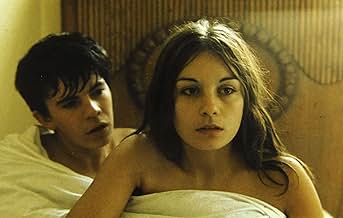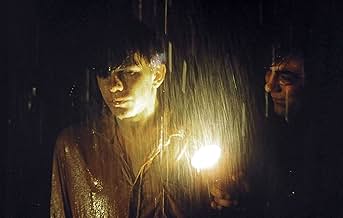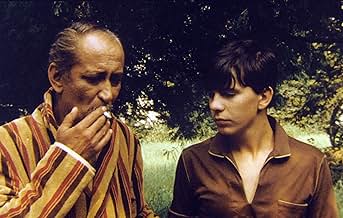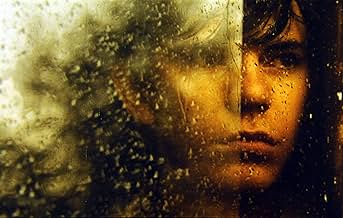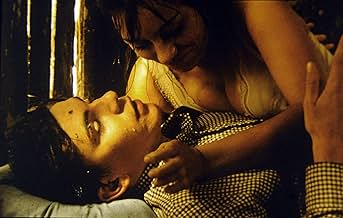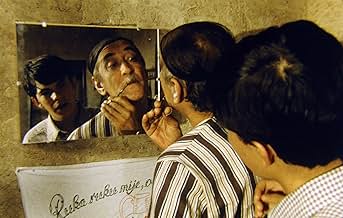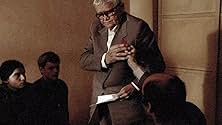IMDb-BEWERTUNG
7,5/10
7108
IHRE BEWERTUNG
Füge eine Handlung in deiner Sprache hinzuA young man's personality is shaped, involving some weird happenings around.A young man's personality is shaped, involving some weird happenings around.A young man's personality is shaped, involving some weird happenings around.
- Regie
- Drehbuch
- Hauptbesetzung
- Auszeichnungen
- 7 Gewinne & 1 Nominierung insgesamt
Pavle Vuisic
- Tetak
- (as Pavle Vujisic)
Zivko 'Zika' Ristic
- Cica
- (as Zika Ristic)
Empfohlene Bewertungen
Emir Kusturica's first film Do You Remember Dolly Bell? is a bittersweet comedy set in the former Yugoslavia during the 1960s. The film, which won the Golden Lion Prize at the 1981 Venice Film Festival, is both a coming of age story and a tribute to the city of Sarajevo, long before it was devastated by civil war. To the chagrin of his strict Communist father (Slobodan Aligrudic), sixteen-year old Dino (Slavo Stimac) is more into hypnosis and self-help mantras than Marxist ideology. He recites the phrase "Every day in every way I'm getting better and better" and sings in a new band mandated by the local Eastern European bureaucracy as they relax the Communist grip and allow some influence of Western culture.
Dino's family of six live in a cramped one-room house while they wait for state housing. The father drinks excessively and the family is poor. This is underscored when, during a visit to relatives, the youngest boy makes a point of saying how much he wishes he had a bicycle like the one he sees in the relative's home. Through Dino's relationship with Sonny, an unsavory pimp, he meets a cabaret singer and prostitute Dolly Bell (Ljiljana Blagojevic), named after a stripper in an Italian film they had seen recently at the Culture Club. Dolly is forced by Sonny to wait in the attic of Dino's home until he returns and Dino is a passive onlooker as a band of delinquent boys take their turn with her.
Dino's sweet innocence captivates the young girl, however, and the two form a bond that results in Dino's sexual initiation and first love affair. Dino has to cope with his father's illness, a lung cancer that has become life-threatening and their days together reveal a much mellower man who tells Dino he knew about the girl in the loft and no longer disapproves his using hypnosis and auto-suggestion. While Dolly Bell lacks the polish and cinematic flair of Kusturica's later work, it is an honest and intelligent film, one that avoids sentimentality and provides compelling insight into what it meant to grow up in Eastern Europe during the sixties.
Dino's family of six live in a cramped one-room house while they wait for state housing. The father drinks excessively and the family is poor. This is underscored when, during a visit to relatives, the youngest boy makes a point of saying how much he wishes he had a bicycle like the one he sees in the relative's home. Through Dino's relationship with Sonny, an unsavory pimp, he meets a cabaret singer and prostitute Dolly Bell (Ljiljana Blagojevic), named after a stripper in an Italian film they had seen recently at the Culture Club. Dolly is forced by Sonny to wait in the attic of Dino's home until he returns and Dino is a passive onlooker as a band of delinquent boys take their turn with her.
Dino's sweet innocence captivates the young girl, however, and the two form a bond that results in Dino's sexual initiation and first love affair. Dino has to cope with his father's illness, a lung cancer that has become life-threatening and their days together reveal a much mellower man who tells Dino he knew about the girl in the loft and no longer disapproves his using hypnosis and auto-suggestion. While Dolly Bell lacks the polish and cinematic flair of Kusturica's later work, it is an honest and intelligent film, one that avoids sentimentality and provides compelling insight into what it meant to grow up in Eastern Europe during the sixties.
10doa2001
Excellent. One word to describe the hour and a half of a master-piece.I'm not so sure that non-ex-yugoslav audience would use word master-piece but I think we would all agree that we are talking about excellent , marvelous , memorable (and etc) movie.Well , to be honest , I never expected less from Emir Kusturica as a director teamed with Abdulah Sidran (who is a poet) as a screenplay writer , who gave the movie intelligent and funny dialogues (really a lot of quotes to remember) combined with deep and memorable talking about communism brought to the audience trough the words of main character Dino's father (whose occupation is head waiter in the restaurant). But , before everything `Do you remember , Dolly Bell' is a movie who drags you to the past , to the 60s in the Sarajevo , Yugoslavia , making you wish that you were there then , just to feel the life of the previous generations in the communist system in the time of yugoslav `brotherhood and unity'. Except that it is also the movie about life in the tough neighbourhood full of scoundrels of any kind. After all, Dolly Bell is a victim of the one of them , and Dino tryes to rescue her in the name of love what gives the movie romantic note.One more good thing in the movie is guaranteed the music.It's simply marvelously selected so it really gives the right image of the 60s in Sarajevo (of course you ought to know that in the 70s Sarajevo became capital of ex-yugoslav rock n' roll , so in some way movie represents roots of rock n' roll in Yugoslavia). So , what more to say than watch the movie and you'll remember Dolly Bell for the rest of your life.
Post written by a person nicknamed No Gods, perhaps just proves that this movie may not be for consumption by audiences outside of the Balkans. He/she completely missed the point. There's so much more to this movie, watching it was of great joy and delight for me.
It gives an honest, simple and raw account of Sarajevo realities back in the 1960s, when it was an expanding city in Tito's Yugoslavia. 'Dolly Bell' offers many memorable snapshots that it uses as setting: teenagers mimicking Adriano Celentano, audiences watching 'Rome by night', couples with children dreaming of moving into new housing complexes built by the communist government, lunches with extended family members, community center struggling to buy instruments for their band.....etc, etc. And all this while the main character Dino (played by Kusturica's favourite Slavko Stimac) is finding his way through adolescence.
Basically, the movie is Kusturica's and Sidran's love letter to their respective childhoods, which happened to take place during an interesting time in Yugoslav history not too long after World War II when the country was being rebuilt under new social order and a tangible sense of excitement of participating in something good and worthy was felt amongst certain sections of its population.
Kusturica would of course go on to make much more serious and challenging films later in his career, but this one shows his ability to successfully deal with simple stories that are not driven by big, complex ideas and don't have an instantly dramatic setting.
It gives an honest, simple and raw account of Sarajevo realities back in the 1960s, when it was an expanding city in Tito's Yugoslavia. 'Dolly Bell' offers many memorable snapshots that it uses as setting: teenagers mimicking Adriano Celentano, audiences watching 'Rome by night', couples with children dreaming of moving into new housing complexes built by the communist government, lunches with extended family members, community center struggling to buy instruments for their band.....etc, etc. And all this while the main character Dino (played by Kusturica's favourite Slavko Stimac) is finding his way through adolescence.
Basically, the movie is Kusturica's and Sidran's love letter to their respective childhoods, which happened to take place during an interesting time in Yugoslav history not too long after World War II when the country was being rebuilt under new social order and a tangible sense of excitement of participating in something good and worthy was felt amongst certain sections of its population.
Kusturica would of course go on to make much more serious and challenging films later in his career, but this one shows his ability to successfully deal with simple stories that are not driven by big, complex ideas and don't have an instantly dramatic setting.
whichever corner of the balkans is called home, it is all but unuarguable that Kusturica is the region's greatest filmmaker. i have enjoyed all of his films - most especially "Otac na sluzbenom putu" and "Underground" - but none disturbed me quite like this one disturbed me.
the reason is that he portrays a (former) Yugoslavia i do not know, and have never known. both my parents fled the "acceptable face of communism" during the very years this film shows almost nostalgically. they were roughly the same age as the main character, yet their experience of Tito's paradise was completely and utterly apposite to what Kusturica shows on the screen. the world they knew was one of deprivation and disappearances and harassment and they could not get away from it fast enough.
i am not saying either viewpoint is right or wrong. i just find it eye-openingly disturbing that the same place at the same time can be remembered in such radically different ways.
i believe there is a lesson in that for all of us, especially those of us whose roots lie in the balkans.
the reason is that he portrays a (former) Yugoslavia i do not know, and have never known. both my parents fled the "acceptable face of communism" during the very years this film shows almost nostalgically. they were roughly the same age as the main character, yet their experience of Tito's paradise was completely and utterly apposite to what Kusturica shows on the screen. the world they knew was one of deprivation and disappearances and harassment and they could not get away from it fast enough.
i am not saying either viewpoint is right or wrong. i just find it eye-openingly disturbing that the same place at the same time can be remembered in such radically different ways.
i believe there is a lesson in that for all of us, especially those of us whose roots lie in the balkans.
In a style that reminds us of Italian neo-realism of last century forties and fifties, Kusturica gives us in syncopated sequences the story of a not so wealthy family whose head is a die-hard Marxist who still believes that communism will come in 2000 (this movie dates back to 1981). The youngsters of the family, however and like youngsters all over the world, are more inclined to rock music than to communism. The story develops itself in episodes of great realism in terms of images, against the background of socialist Yugoslavia which appears here and there in the speeches of a local official who thinks that juvenile delinquency can be fought by creating a juvenile rock ensemble in a club, in the Marxist talk of the old father and in the efforts he makes to get a house provided by the State to replace the squalid dwelling where the family lives. Ironically this will come only after his death. Behind the apparent simplicity of the story we feel that its characters have deepness of feelings and reactions, being very human. Love is present in its various forms though shown almost bashfully. The love between father and son and the love between the son and the young prostitute for instance. The action takes place in Bosnia but nothing in the movie makes us to surmise the bloodbath that occurred there 20 years after. In conclusion we can say this is a good and well made movie.
Wusstest du schon
- WissenswertesWinner Best Actor (Slavko Stimac) at 25th Panama International Film Festival.
- VerbindungenFeatured in Die Hand Gottes - Emir Kusturica trifft Diego Maradona (2008)
- Soundtracks24 mila baci
Written by Adriano Celentano, Lucio Fulci, Piero Vivarelli
Performed by Adriano Celentano
[Sung along to by Slavko Stimac]
Top-Auswahl
Melde dich zum Bewerten an und greife auf die Watchlist für personalisierte Empfehlungen zu.
- How long is Do You Remember Dolly Bell??Powered by Alexa
Details
Zu dieser Seite beitragen
Bearbeitung vorschlagen oder fehlenden Inhalt hinzufügen

Oberste Lücke
By what name was Erinnerst Du Dich an Dolly Bell? (1981) officially released in India in English?
Antwort
